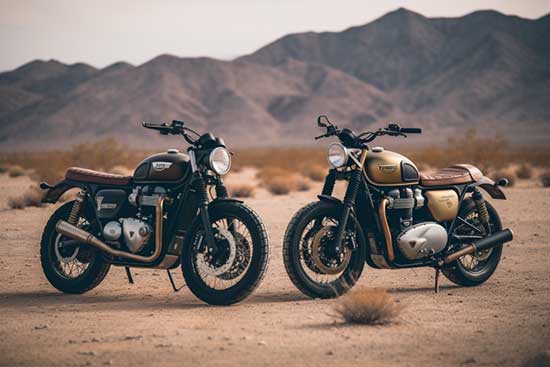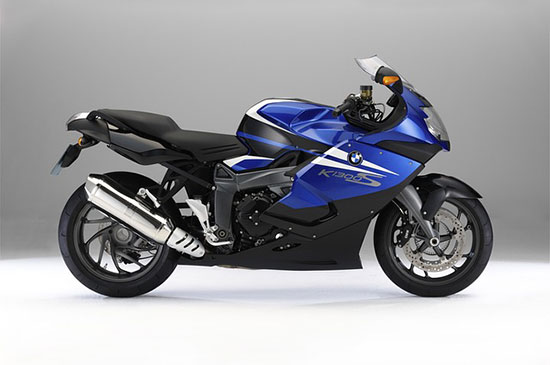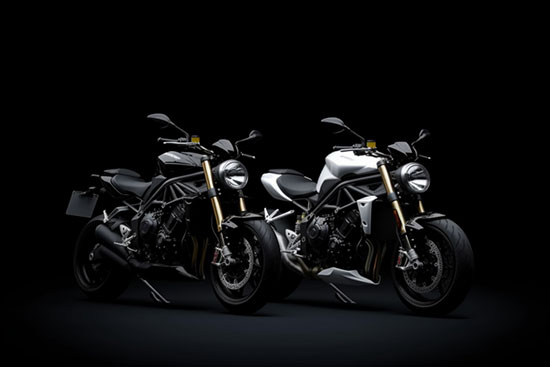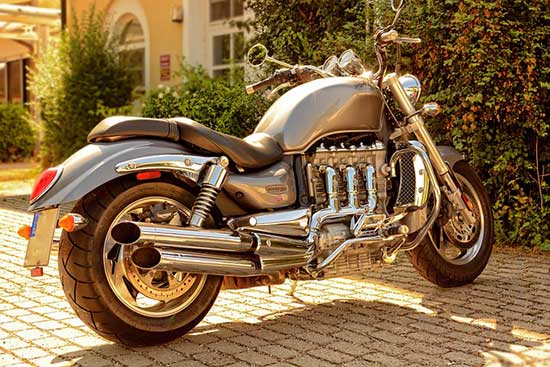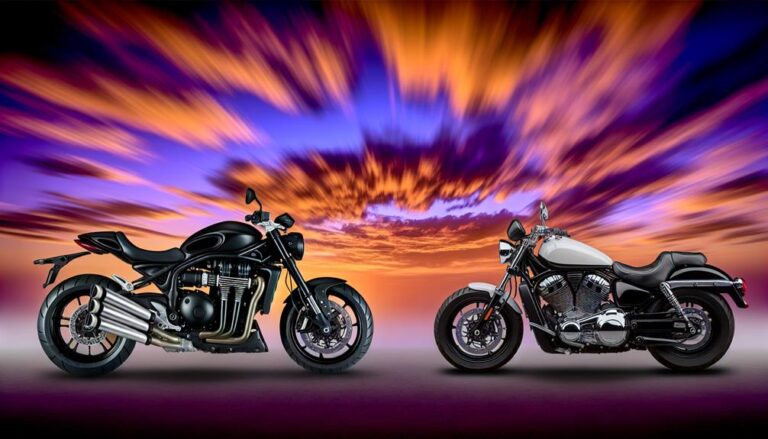When it comes to classic motorcycles, the Triumph brand is at the top of the list. Among the many models that Triumph has produced, the Street Twin and Bonneville are two of the most popular models.
Both bikes offer an elegant design and powerful capabilities, providing riders with an unforgettable experience on the road.
But which one is better? Let’s see.
Contents
Design
The design of the Street Twin and the Bonneville pays homage to their classic roots, with sleek lines and vintage features. However, there are some notable differences to consider.
The Triumph Street Twin has a neo-retro design with a stripped-back style that emphasizes its classic features.
The bike has a minimalistic look with a blacked-out chassis, headlight, and fork gaiters. The fuel tank has a brushed aluminum finish, and the seat is simple and comfortable, with a single diamond stitch in the middle.
The Street Twin also features spoked wheels with black rims, adding to the overall vintage look.
On the other hand, the Triumph Bonneville has a more traditional design. The fuel tank is broader, and the seat has more curves.
The bike has two clocks on the dashboard, adding to its classic look. The Bonneville also features a twin-silencer exhaust system, which adds both style and sound to the motorcycle.
While both bikes have a classic design, the Street Twin is more modern and minimalistic, whereas the Bonneville is more traditional.
Performance
When it comes to performance, both motorcycles impress with their power and handling. However, there are some differences in their specs.
The Triumph Street Twin features a 900cc parallel-twin engine that produces 64 horsepower and 59 lb-ft of torque.
The engine is liquid-cooled and fuel-injected, providing a smooth ride. The Street Twin also has a six-speed gearbox and a slip-assist clutch, which reduces the effort needed to operate the clutch lever.
Meanwhile, the Triumph Bonneville comes with a 1200cc parallel-twin engine that produces 76 horsepower and 78 lb-ft of torque.
The engine is also liquid-cooled and fuel-injected with a six-speed gearbox. However, the Bonneville has a heavier clutch compared to the Street Twin, which requires more effort to operate.
Overall, the Bonneville has a higher engine displacement and more horsepower, but the Street Twin is lighter and has a more agile feeling on the road.
Handling
When it comes to handling, both bikes are easy to maneuver, but again, there are some differences to consider.
The Street Twin has a low seat height, which makes it easier for riders to get their feet on the ground.
The bike also has a narrow handlebar, which provides excellent control in tight corners. The Street Twin weighs around 198kg, making it lighter than the Bonneville.
In comparison, the Bonneville has a more extended wheelbase and a higher seat height, making it slightly harder to handle.
However, the bike has a broad handlebar, providing better control and a comfortable riding position. The Bonneville weighs around 238kg, making it heavier than the Street Twin.
While both bikes are easy to handle, the Street Twin is lighter and more agile, making it perfect for city riding. The Bonneville is better suited for longer, more open roads.
Price
Another significant difference between the Street Twin and the Bonneville is the price.
The Triumph Street Twin has an MSRP starting at $9,300, making it the more affordable option. However, the price can go up depending on the features and accessories added to the motorcycle.
Meanwhile, the Triumph Bonneville has an MSRP starting at $12,050, making it a more expensive option.
However, like the Street Twin, the price can increase depending on the added features and accessories.
| Feature | Triumph Street Twin | Triumph Bonneville |
|---|---|---|
| Engine | 900cc, parallel twin | 900cc or 1,200cc, parallel twin (varies) |
| Power Output | Approx. 64 horsepower | Varies depending on the model and engine size |
| Torque | Approx. 59 lb-ft | Varies depending on the model and engine size |
| Riding Modes | Road, Rain | Road, Rain, Sport, Custom (varies) |
| Suspension | KYB forks and twin rear shocks | KYB forks and twin rear shocks |
| Brakes | Nissin, twin-piston front caliper | Nissin, twin-piston front caliper |
| ABS | Dual-channel ABS | Dual-channel ABS |
| Electronics | Basic instrument cluster | TFT color display, advanced features |
| Weight | Approx. 198 kg (436 lbs) | Varies depending on the model and engine size |
| Seat Height | Approx. 760 mm (29.9 inches) | Varies depending on the model and engine size |
| Ergonomics | Upright and relaxed riding position | Upright and relaxed riding position |
| Target Audience | Entry-level riders, urban commuting | Riders seeking classic retro style |
| Price (approximate) | Lower price range | Varies depending on the model and engine size |
Conclusion
In conclusion, both the Triumph Street Twin and the Bonneville are exceptional motorcycles, providing riders with a unique riding experience.
The Street Twin has a more modern design, lighter weight and is more affordable, and is better suited for city riding.
The Bonneville has a more conventional design, and a more powerful engine, and is better suited for longer, more open roads.
Ultimately, choosing between the two bikes will come down to personal preference and the type of riding you plan on doing.
Whichever one you choose, you can be assured that you are getting a quality motorcycle with a rich history and timeless design.

